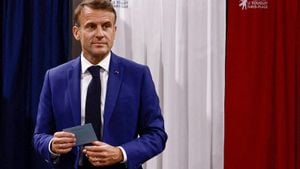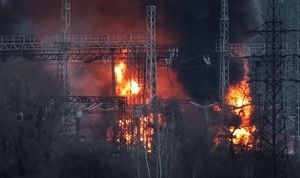The spotlight is shining brightly on Azerbaijan as it hosts the U.N. Climate Change Conference, COP29, where the country’s president, Ilham Aliyev, took to the stage to defend fossil fuels passionately. His speech sharply criticized Western media narratives, referring to Azerbaijan’s oil and gas reserves as "a gift from God" and emphasizing the natural rights of nations to utilize their resources.
With more than 75 world leaders converging in Baku, Aliyev’s remarks set the tone for discussions less about reducing fossil fuel reliance and more about justifying its continued use. He pointedly expressed his frustration over what he termed the "slander and blackmail" aimed at his country due to its fossil fuel production. "No country should be judged for its natural resources," he stated, challenging the scrutiny aimed at nations like Azerbaijan.
Azerbaijan, as noted by Aliyev, contributes only a fraction to global emissions, yet he feels unfairly targeted. "Right after Azerbaijan was elected as the host country of COP29, we became targets of coordinated smear campaigns," he declared, underscoring what he sees as hypocrisy embedded within climate debates. His strong defense of fossil fuels and emphasis on Azerbaijan's energy resources raised eyebrows, especially as the world scrambles to address climate change more urgently than ever.
During his opening addres, Aliyev made it clear where he stands: "I want to repeat: this is a gift of God." He expanded on the portfolio of resources from Azerbaijan, encompassing oil, gas, wind, sunlight, gold, silver, and copper. According to him, these are commodities the market demands, and countries should not be discredited for engaging with such resources.
Alongside him, the COP29 president, Mukhtar Babayev, acknowledged the need for trillions of dollars to combat climate change but urged negotiators to accept smaller figures as realistic expectations. His statements echoed the mounting frustration among developing nations craving more substantial commitments from wealthier, historical carbon emitters. Namely, many developing countries, represented by the G77+ China bloc, rejected proposals they deemed insufficient, reigniting historic divides over climate financing duties.
The dissatisfaction is palpable, with Adonia Ayebare, chair of the G77+ bloc, voiceing their firm stance against the draft deals circulating at the conference, stating, "We cannot accept it, and we asked them to produce new parameters for climate financing documents," alluding to the overdue responsibilities of richer nations to support developing countries facing harsher climate impacts.
Fernanda Carvalho from WWF highlighted the mistrust stifling negotiations, claiming, "Countries are divided. There is a lack of trust." It's this environment of skepticism coupled with demands for financial justice which could shape the conference outcome significantly.
Meanwhile, attendees from major industrial nations who contribute substantially to global emissions—such as the U.S., China, and those within the European Union—were noticeably absent. Leaders from these nations, previously making headlines for ambitious climate commitments, are now grappling with the fallout from economic challenges and shifting political landscapes, leaving developing nations frustrated over their absence during pivotal talks.
Aliyev’s declaration served as both rallying speech and warning shot across the bow of international climate politics. His comments managed to stoke pushback from environmental groups, with critiques pointing out the dangerous narratives embedded within his messages. Alex Rafalowicz, head of the Fossil Fuel Non-Proliferation Treaty Initiative, rebuffed Aliyev’s claims by stating, "Countries are not to blame for their natural resources, but they are responsible for the threat they pose to humanity by extracting them and driving climate impacts.”
This backdrop led to contrasting narratives during the summit. While Azerbaijan's representatives insisted on their sovereign right to pursue fossil fuel extraction, global leaders and climate activists underscored the dire need for urgent behavioral changes to stave off catastrophic climate outcomes.
Compounding the tensions at COP29, the conference’s agenda aimed to discuss substantial financial pledges to facilitate the transition toward clean energy sources and the necessity for nations to adapt to climate change environments. With leaders like U.S. President Joe Biden away and former President Donald Trump’s looming presence casting uncertainty over future American climate initiatives, it raises questions about coalition stability moving forward.
The World Bank and similar institutions face mounting pressure to fulfill promises of climate financing, committing to enable poorer nations to respond effectively to climate challenges. U.N. Secretary-General Antonio Guterres encapsulated this urgency during his remarks, stating, “The world must pay up, or humanity will pay the price.”
President Aliyev’s comments at COP29 stir the debate: Should fossil fuel-rich nations cling to their resources, deemed necessary for the market, or must they heed global calls for restraint and pivot to greener alternatives? Each position reflects the angst echoed by many developing nations grappling with climate vulnerabilities, yet complexity layers the discourse within the halls of power at COP29.
The discussions at COP29 will serve as reflections of the broader climate debate. With developing countries seeking climate justice and accountability from major emitting nations, the outcomes of this conference may well define the cooperative pathways—or the contentious standoffs—between coalitions on climate action for years to come. And as the world watches, it remains uncertain if Azerbaijan's passionate defense of fossil fuels might just galvanize budding discussions around energy sovereignty or sour relations among allies seeking environmental progress.



